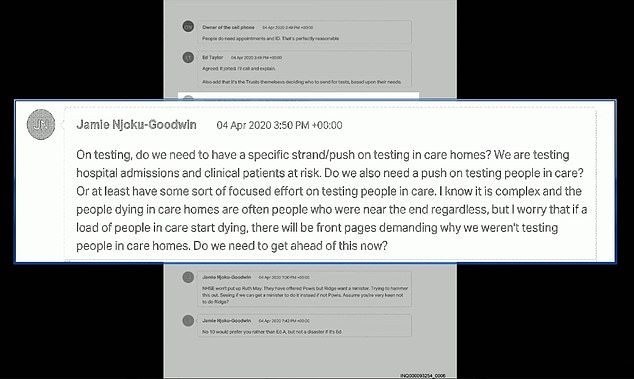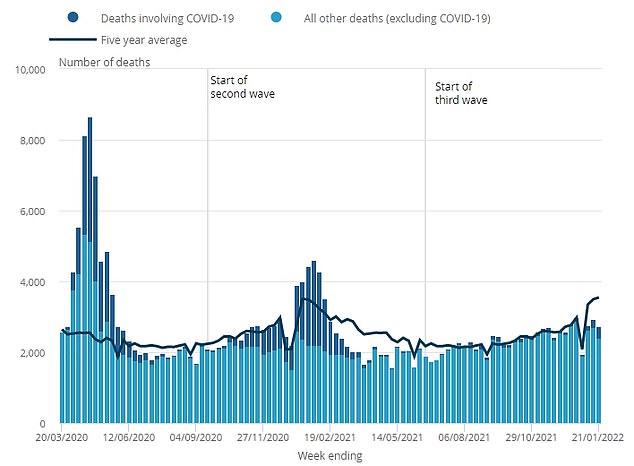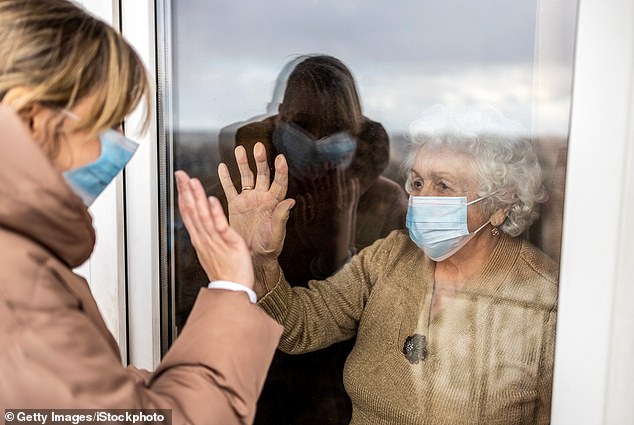Matt Hancock defends catastrophic decision to empty infected patients into care homes, letting Covid run riot as shamed ex-Health Secretary says ‘every decision was a choice between difficult options’ in grilling over testing failures
Matt Hancock has defended the crisis of Covid-positive patients being discharged to care homes, blamed for thousands of deaths.
Care homes in England were forced to admit hospital patients who had not been tested. They then recorded more than 43,000 Covid deaths during the first two years of the pandemic.
This is despite claims from the disgraced former health minister that the government had cast a 'ring of protection' around care homes.
Mr Hancock today told the Covid Inquiry that any decision on discharging care home patients during the pandemic was 'a choice between difficult options'.
He argued that no one has offered a different approach to dealing with overwhelmed NHS hospitals, where 'more lives would have been saved'.
Mr Hancock also blamed a lack of swab tests for not being offered 'as much testing in care homes as many would have wanted'.
Mr Hancock (pictured today) told the Covid Inquiry that any decision on discharging care home patients during the pandemic was 'a choice between difficult options'

The inquiry also found that Mr Hancock had been warned that there needed to be a 'targeted effort' to test people in care homes. A WhatsApp message from his advisor, Jamie Njoku-Goodwin, on April 4, 2020 said: “Do we need a specific component/urgency in testing in care homes? We test hospital admissions and clinical risk patients'
Discussing the discharge of NHS patients to care homes, Mr Hancock said 'every decision was a choice between difficult options'.
Leaving patients under NHS care would have made it more likely they had contracted Covid due to the risks of hospital infections, he said.
He said “it was rational and reasonable to ensure they were in the safest place they could be.”
Mr Hancock said: 'I fear that if we had left those patients in hospital – those who were medically fit to be discharged – there is a good chance that more people would have been infected with Covid and the problem would have been worse can be.'
He added: 'No one has yet brought me a solution to this problem that I think, even in retrospect, would have resulted in more lives saved.'
The investigation also found that Mr Hancock had been warned that there was a 'targeted effort' on testing people in care homes.
Mr Hancock said there was 'not as much testing in care homes as many would have liked' because Britain 'didn't have enough tests'.
A WhatsApp message from his advisor, Jamie Njoku-Goodwin, on April 4, 2020 stated: 'On testing, should we have a specific line/insistence on testing in care homes? We test hospital admissions and clinical risk patients.
'Do we also need an impetus to test people in healthcare? Or at least make some targeted effort to test people in healthcare.
'I know it is complex and that the people who die in care homes are often people who were almost at the end anyway, but I am afraid that if many people die in care, there will be front pages asking why we let people have not tested. in nursing homes.
“Should we get ahead of this now?”
Mr Hancock's WhatsApp response said: 'Let's get quick advice on bringing all perspectives together.'
Commenting on the exchange, Mr Hancock told the inquiry: 'The reason we didn't have as many tests in care homes at the time as many would have liked was that we didn't have enough tests and the clinical prioritization of who to get a test received, in what order, was definitely something I wouldn't have bothered with.'
He was asked if he was aware that care homes are homes for disabled adults who live in long-term care from a young age, as well as for people who are “near the end.”
Mr Hancock said: 'I absolutely had that in mind and had done a lot of work before the pandemic in improving outcomes for those in adult social care.'

Data from the Office for National Statistics shows that there were more than 43,000 deaths involving Covid in care homes in England and Wales in the first two years of the pandemic

Government guidance will be published on April 2, 2020, setting out the restrictions on visits to care homes. The guidance said that 'family and friends should be advised not to visit care homes, except bereaved families in exceptional situations such as the end of life.' It added: 'alternatives to in-person visiting should be explored, including the use of telephones or video, or the use of plastic or glass barriers between residents and visitors'
He said the fact that his response to Mr Njoku-Goodwin's WhatsApp message did not correct his adviser “does not in any way imply that I did not think that”.
The former health minister said Mr Njoku-Goodwin was “one of the most exceptional public servants”, but added that he approached the issue “from a communications point of view in terms of what the newspapers might say”.
In his pandemic diaries, published in the Daily Mail last year, Mr Hancock claimed hospital discharges were not responsible for the thousands of deaths in care homes.
Instead, he pointed the finger at infections “brought in from the wider community, mainly by staff.”
However, others have blamed the lack of testing among those released from hospital.
The NHS was ordered in mid-March 2020 to discharge the thousands of inpatients who were medically fit to leave into adult social care, to free up beds and support those with acute healthcare needs.
And care homes were told that 'negative tests are not necessary' for new hospital admissions.
This is despite Sir Chris Whitty, England's chief medical officer, warning that anyone going into care homes should be tested, according to Mr Hancock's WhatsApp messages, which were leaked by journalist Isabel Oakeshott.
